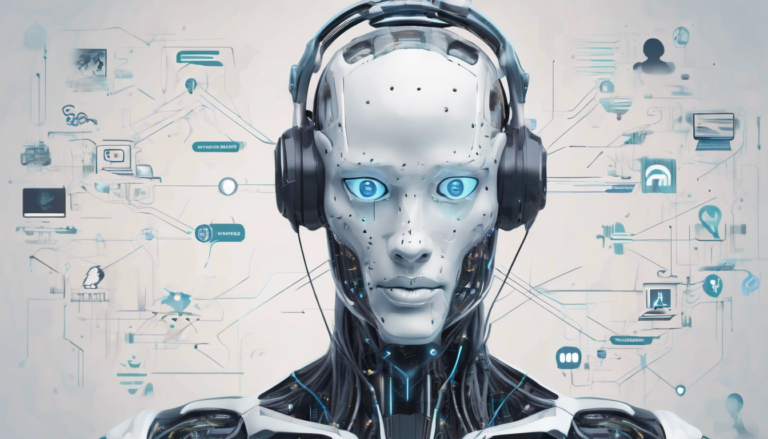Will AI Cure Your Depression? Promising Research, But Can a Machine Replace a Human?
In a world where access to psychological care often feels like tilting at windmills – long waiting lists, astronomical costs, and a shortage of specialists – a new hope emerges on the horizon: artificial intelligence. As reported by MIT Technology Review, the first trials of generative AI-based therapy yield surprisingly promising results in treating depression. Is this a breakthrough that will forever change the face of mental health, or a risky experiment on human emotions that could lead to greater alienation and psychological challenges?
The article in MIT sheds light on pioneering research where generative AI was used to support people struggling with depression. The chatbot called Therabot was created by a team from the Geisel School of Medicine at Dartmouth College and was used in the first clinical trial of generative AI-based therapy, which showed it can help reduce depressive symptoms. Therabot is distinguished by the fact that it was designed with the help of psychologists and psychiatrists, and its operation is based on therapeutic best practices, such as cognitive-behavioral therapy (CBT). Researchers found that patients who used AI-based therapy experienced significant mood improvement and a reduction in depressive symptoms. Moreover, AI proved capable of conducting personalized therapy sessions, adapting its responses to the individual needs and emotions of patients
“It’s amazing how well AI can understand my emotions,” says one study participant quoted in the article. “I felt like I was talking to someone who really listened to me.”
The Potential of AI in Psychotherapy: More Than Just Chatbots
While therapeutic chatbots take center stage, the potential of AI in psychotherapy is much broader. AI can:
- Increase Accessibility: Chatbots and AI applications can offer psychological support 24/7, eliminating geographical and time barriers. For people living in remote areas or those with mobility issues, AI may be the only form of accessible help.
- Reduce Costs: AI therapy can be significantly cheaper than traditional sessions with a therapist, making it more accessible to people with limited financial resources.
- Personalize Therapy: AI algorithms can analyze vast amounts of data to tailor therapy to individual patient needs. They can monitor progress, identify behavioral patterns, and provide personalized interventions.
- Support Therapists: AI can serve as a supportive tool for human therapists, helping them with diagnosis, treatment planning, and monitoring patient progress.
Therapeutic Chatbots: Digital Friends or Cold Machines?
Therapeutic chatbots, such as Woebot and Wysa, are gaining popularity. They use cognitive-behavioral therapy (CBT) techniques to support users in managing stress, anxiety, and depression. Reddit users share their experiences with therapeutic chatbots, often expressing surprise at their effectiveness.
“I was skeptical at first, but this chatbot really helped me,” writes one user. “I felt like I had someone to turn to when I needed it.
However, there are also critical voices raising issues of lack of empathy and authenticity in interactions with chatbots. “It’s not the same as talking to a real person,” notes another user. “I miss that human warmth and understanding.”
AI Analyzes Mood: From Smartphone to Diagnosis
AI can also analyze users’ moods based on data from their mobile devices. Algorithms can monitor social media activity, sleep patterns, physical activity levels, and even tone of voice during phone calls. Based on this data, AI can identify early signs of mental health deterioration, such as increased anxiety, low mood, or social isolation.
For example, if AI notices that a user suddenly starts spending more time on social media, posts negative content, and sleeps less, it may be a warning sign that the person needs support.
As Scott Wallace (PhD in Clinical Psychology) on Linkedin point out, AI has the potential to both support and deteriorate mental health. On one hand, it can help identify people in need and provide them with personalized assistance. On the other hand, improper use of AI can lead to excessive reliance on technology, loss of privacy, and deepening social inequalities.
Challenges and Limitations: Ethics, Privacy, and Lack of Empathy
The introduction of AI into psychotherapy involves a number of challenges and limitations.
- Ethics: How to ensure that AI is used ethically and responsibly? How to avoid discrimination and biases in AI algorithms? How to protect patient autonomy and ensure their right to refuse AI therapy?
- Privacy: How to protect sensitive patient data, such as medical history, emotions, and thoughts? How to prevent data leaks and unauthorized access to information?
- Lack of Empathy: Can AI replace a human therapist who offers empathy, understanding, and emotional support? Can interactions with AI be as effective as relationships with a living person?
- Risk of Errors: AI algorithms can make mistakes, which can lead to incorrect diagnoses and treatment plans. How to ensure that AI operates reliably and safely?
The Future of Psychotherapy: Human and Machine Side by Side?
The future of psychotherapy will likely combine elements of human interaction with the capabilities of AI. As Stanford HAI suggests, AI can become a powerful tool supporting human therapists, helping them with diagnosis, treatment planning, and monitoring patient progress.
At the same time, it’s important to remember the limitations of AI and not treat it as a substitute for human contact. Empathy, understanding, and authenticity will remain key elements of effective therapy.
Perhaps the future of psychotherapy is a synergy of human and machine – therapists supported by AI, offering patients comprehensive and personalized care.
Will AI revolutionize psychotherapy? The answer to this question remains open. However, one thing is certain: artificial intelligence is already playing an increasing role in the field of mental health, and its impact will only grow in the coming years.
Sources:
- Artificial Intelligence and the Future of Psychotherapy – PubMed
- 7 Ways AI Will Make (or Break) Mental Health by 2025 – LinkedIn
- Future of Therapy: AI’s Impact on Mental Health Care
- Application of Artificial Intelligence on Psychological Interventions …
- 5 barriers to mental health treatment and access to care – Bonterra
- The Use of Artificial Intelligence in Psychotherapy – PubMed Central
- A Blueprint for Using AI in Psychotherapy | Stanford HAI







